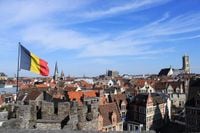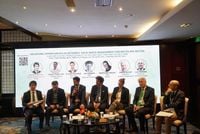Belgium’s King Philippe made a historic visit to Vietnam from March 31 to April 4, 2025, marking the first time a Belgian monarch has set foot in the Southeast Asian nation. Accompanied by a large delegation of business, academic, and political leaders, King Philippe’s trip aims to strengthen bilateral relations and foster cooperation in various sectors, particularly in green hydrogen and waste management.
During his visit, King Philippe met with Vietnam’s President Luong Cuong, who hailed the trip as a significant milestone in the relationship between the two countries. President Cuong emphasized the importance of Belgium ratifying an investment protection agreement between Vietnam and the European Union, which was signed in 2019 but still awaits ratification from a third of the EU's 27 member states. This agreement is seen as crucial for facilitating future investments and enhancing economic ties.
"We urge Belgium to expedite the ratification process to solidify our partnership," Cuong stated, highlighting the urgency of the matter amidst growing trade tensions with the United States. In the coming weeks, other top EU leaders, including Spain’s Prime Minister Pedro Sanchez and EU trade commissioner Maros Sefcovic, are expected to visit Vietnam as part of efforts to deepen relations between Hanoi and Brussels.
One of the key outcomes of King Philippe’s visit was the signing of provisional, non-binding agreements between Belgian engineering firm John Cockerill and Vietnamese partners to collaborate on the production of green hydrogen. These agreements represent a potential first step towards establishing a factory in Vietnam dedicated to manufacturing pressurized alkaline water electrolysers, essential for hydrogen production.
A spokesperson for John Cockerill indicated that the factory would serve the entire Southeast Asian region, although specific investment figures were not disclosed. Vietnam has ambitious plans to produce approximately 15 gigawatts of electricity from hydrogen by mid-century, a slight reduction from its previous target of 16.4 gigawatts. This target is part of the country’s revised long-term power plan, which aims for hydrogen to account for about 2% of its total installed capacity by 2050.
In addition to discussions on hydrogen production, the visit also focused on Vietnam's pressing waste management challenges. Representatives from several Belgian companies, including Ecosteryl and the University of Liège, engaged in discussions about modern waste treatment technologies and management models. Deputy Minister of Agriculture and Environment Le Cong Thanh highlighted the significant hurdles Vietnam faces, including a shortage of sanitary landfills and a lack of advanced waste treatment methods.
"Despite setting ambitious goals for solid waste management, we still encounter substantial obstacles," Thanh remarked, pointing out that solutions like waste reduction, recycling, and energy recovery from waste have not been prioritized. He expressed optimism about the potential for Belgian technical assistance and advanced technology transfer to improve Vietnam’s waste management systems.
Minister-President of the Wallonia region, Adrien Dolimont, echoed this sentiment, stating, "Our two countries have significant potential to develop sustainable solutions based on shared experiences and technologies." He emphasized the urgency of transitioning towards a circular economy and the importance of international cooperation, particularly between Belgium and Vietnam.
"Sustainability cannot be achieved in isolation. It requires strong partnerships and a common vision for a greener future," Dolimont added, reinforcing the collaborative spirit of the discussions. Both sides are exploring the possibility of launching pilot projects in select Vietnamese localities, which could serve as a foundation for scaling up effective waste management practices nationwide.
As the visit unfolds, it is clear that the relationship between Belgium and Vietnam is poised for growth. With a focus on green hydrogen and sustainable waste management, both nations are looking to leverage their strengths to address global challenges, such as climate change and environmental degradation.
Vietnam, recognized for its rapid economic development, is eager to enhance its technological capabilities and improve its environmental policies. Meanwhile, Belgium, known for its advanced waste recycling strategies, stands ready to assist in this endeavor. The cooperation established during King Philippe’s visit could pave the way for innovative solutions tailored to the unique needs of Vietnam’s society.
In conclusion, the state visit by King Philippe not only signifies a deepening of diplomatic ties but also highlights the commitment of both countries to work together on crucial issues that affect their populations and the environment. As they embark on this journey of collaboration, the hope is that their partnership will yield tangible benefits for both nations and contribute to a more sustainable future.





